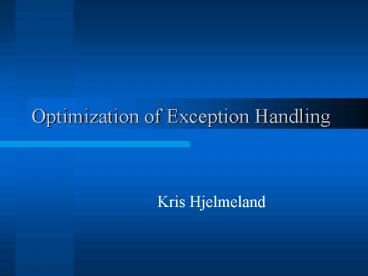Optimization of Exception Handling PowerPoint PPT Presentation
1 / 23
Title: Optimization of Exception Handling
1
Optimization of Exception Handling
- Kris Hjelmeland
2
Introduction
- Why is exception handling important?
3
What is Exception Handling?
- An exception is a computational state that
requires an extraordinary computation. - A handler is a code fragment that deals with an
exception occurrence.
4
Strategies for Handling Exceptions
- Take Control so program can continue
- Throw for handling elsewhere
- Ignore the problem altogether
5
Exception Handling in Languages
- Languages like C, return a value from a function
call. - Java and C use exception handling mechanisms.
6
Java Exception Handling in the JVM
- Exception is thrown
- JVM searches table for handler
- System branches to handler
- If handler not found
- Search continues up hierarchy
- Thread will terminate if an appropriate handler
does not exist
7
Exception Handling Techniques
- Return Code
- if(returnvalue errorvalue)
- //do error handling
- Status Flag
8
Drawbacks of Older Techniques
- Dependent on programmer
- Requires timely error checking
- Reduces readability
- Error checking omissions
9
Goals of an Exception Handling Mechanism
- Alleviate testing throughout the program
- Prevent incomplete operations from continuing
- Allow for the adding, changing, and removing of
exceptions
10
Optimization of EHM
- Suggested EHM Requirements
- Appropriate Handling Models
- Integration of Optimal Features
11
Suggested EHM Requirements
- Reusability
- Encapsulation
- Totality
- Consistency
- Readability
12
Reusability
- Object-oriented design provides reusability
- Most software components are reusable
- Reusability saves time and resources.
13
Encapsulation
- Encloses data, methods, and definitions in a
class capsule - Separates the interface from the definition
- Helps provide better readability and reusability
14
Totality
- Must detect all different types of errors
- Must protect against all state and timing errors
- Solutions need to encompass the entire program.
15
Consistency
- Program should return to its original state after
an error - All resources should be cleaned up after an
exception terminates - Shared data and resources must be maintained
16
Readability
- Exception handling should not cause errors
because of messy code - Separating the exception handling code from main
execution code is optimal.
17
Inadequate Readability
- int error_value -1
- if(functionCall1() error_value)
- //fix the error
- if(functionCall2() error_value)
- //fix the error
- if(functionCall3() error_value)
- //fix the error
18
Adequate Readability
- try
- functioncall1()
- functioncall2()
- functioncall3()
- catch(Exception e)
- //fix the error
19
Handling Models
- Termination Model
- An alternative operation to its guarded block
- Resumption Model
- Very similar to a routine or method call
20
Optimal Features
- Catch-any and Reraise
- Pass exception to an appropriate place
- Derived Exceptions
- Allows for a hierarchy of exceptions
- Exception Parameters
- Pass data along to the handler
21
Conclusion
- The optimization of exception handling
affectively returns life to normal.
22
References
- Borger, E. and Schulte, W. "A Practical Method of
Specification and Analysis of Exception Handling
- A Java/JVM Case Study," IEEE Transactions on
Software Engineering, vol. 25, no. 9, September
2000. - Buhr, B. A. and Russell Mok, W. Y., "Advanced
Exception Handling Mechanisms," IEEE Transactions
On Software Engineering, vol. 26, no. 9,
September 2000. - Knudsen, J., L. "Exception Handling Versus Fault
Tolerance," Exception Handling in Object Oriented
Systems Workshop at ECOOP'2000, June 12, 2000. - Lang, J. and David, S. B., "A study of the
applicability of existing exception handling
techniques to component-based real-time software
technology," ACM Transactions on Programming
Languages Systems, vol. 20, no. 2, p. 274,
March 1998. - Maxion, R. A. and Olszewski, R. T., "Eliminating
Exception Handling Errors with Dependability
Cases A Comparative, Empirical Study," IEEE
Transactions on Software Engineering, vol. 25,
no. 9, September 2000. - Mikhailova, A. and Romanovsky A.,
"Behavior-Preserving Evolution of Interface
Exceptions,Exception Handling in Object Oriented
Systems Workshop at ECOOP'2000, June 12, 2000. - Waldo, J. "Throwing Things," UNIX Review's
Performance Computing, vol. 16, p71, May 1998.
23
Optimization of Exception Handling
- Thank You
- Kris Hjelmeland

